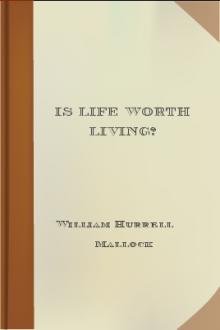Is Life Worth Living?, William Hurrell Mallock [if you give a mouse a cookie read aloud txt] 📗

- Author: William Hurrell Mallock
- Performer: -
Book online «Is Life Worth Living?, William Hurrell Mallock [if you give a mouse a cookie read aloud txt] 📗». Author William Hurrell Mallock
Creeps in this petty pace from day to day;
And all our yesterdays have lighted fools
The way to dusty death.
This, for all that sociology can inform us to the contrary, may be the lesson really taught us by the positive philosophy of progress.
But what the positivists themselves learn from it, is something very different. The following verses are George Eliot's:
Of those immortal dead who live again
In lives made better by their presence. So
To live is heaven....
To make undying music in the world,
Breathing us beauteous order that controls
With growing sway the growing life of man.
So we inherit that sweet purity
For which we struggled, groaned, and agonised
With widening retrospect, that bred despair....
That better self shall live till human time
Shall fold its eyelids, and the human sky
Be gathered like a scroll within the tomb
Unread for ever. This is life to come,
Which martyred men have made more glorious
For us who strive to follow. May I reach
That purest heaven, and be to other souls
That cup of strength in some great agony,
Enkindle generous ardour, feed pure love,
Beget the smiles that have no cruelty,
Be the sweet presence of a good diffused,
And in diffusion ever more intense;
So shall I join that choir invisible
Whose music is the gladness of the world.
Here is the positive religion of benevolence and progress, as preached to the modern world in the name of exact thought, presented to us in an impassioned epitome. Here is hope, ardour, sympathy, and resolution, enough and to spare. The first question is,—How are these kindled, and what are they all about? They must, as we have seen, be about something that the science of sociology will not discover for us. Nor can they last, if, like an empty stomach, they prey only upon themselves. They must have some solid content, and the great thing needful is to discern this. It is quite true that to suffer, or even to die, will often seem dulce et decorum to a man; but it will only seem so when the end he dies or suffers for is, in his estimation, a worthy one. A Christian might be gladly crucified if by so doing he could turn men from vice to virtue; but a connoisseur in wine would not be crucified that his best friend might prefer dry champagne to sweet. All the agony and the struggles, then, that the positivist saint suffers with such enthusiasm, depend alike for their value and their possibility on the object that is supposed to cause them. And in the verses just quoted this object is indeed named several times; but it is named only incidentally and in vague terms, as if its nature and its value were self-evident, and could be left to take care of themselves; and the great thing to be dwelt upon were the means and not the end: whereas the former are really only the creatures of the latter, and can have no more honour than the latter is able to bestow upon them.
Now the only positive ends named in these verses are 'the better self,' 'sweet purity,' and 'smiles that have no cruelty.' The conditions of these are beauteous order,' and the result of them is the 'gladness of the world.' The rest of the language used adds nothing to our positive knowledge, but merely makes us feel the want of it. The purest heaven, we are told, that the men of any generation can look forward to, will be the increased gladness that their right conduct will secure for a coming generation: and that gladness, when it comes, will be, as it were, the seraphic song of the blessed and holy dead. Thus every present, for the positivist, is the future life of the past; earth is heaven perpetually realising itself; it is, as it were, an eternal choir-practice, in which the performers, though a little out of tune at present, are becoming momently more and more perfect. If this be so, there is a heaven of some sort about us at this moment. There is a musical gladness every day in our ears, our actual delight in which it might have been a heaven to our great-grandfathers to have anticipated in the last century.
Now it is plain that this alleged music is not everywhere. Where, then, is it? And will it, when we have found it, be found to merit all the praise that is bestowed upon it? Sociology, as we have seen, may show us how to secure to each performer his voice or his instrument; but it will not show us how to make either the voice or the instrument a good one; nor will it decide whether the orchestra shall perform Beethoven or Offenbach, or whether the chorus shall sing a penitential psalm or a drinking song. When we have discovered what the world's highest gladness can consist of, we will again come to the question of how far such gladness can be a general end of action.
[9] Vide Nineteenth Century, October, 1877.
[10] 'As Mr. Spencer points out, society does not resemble those organisms which are so highly centralised that the unity of the whole is the important thing, and every part must die if separated from the rest; but rather those that will bear separation and reunion; because, although there is a certain union and organisation of the parts in regard to one another, yet the far more important fact is the life of the parts separately. The true health of society depends upon the communes, the villages and townships, infinitely more than on the form and pageantry of an imperial government. If in them there is band-work, union for a common effort, converse in the working out of a common thought, there the Republic is.'—Professor Clifford, Nineteenth Century, October, 1877.
CHAPTER IV. GOODNESS AS ITS OWN REWARD.'Who chooses me must give, and hazard all he hath.' Inscription on the Leaden Casket. Merchant of Venice.
What I have been urging in the last chapter is really nothing more than the positivists admit themselves. It will be found, if we study their utterances as a whole, that they by no means believe practically in their own professions, or consider that the end of action can be either defined and verified by sociology, or made attractive by sympathy. On the contrary, they confess plainly how inadequate these are by themselves, by continually supplementing them with additions from quite another quarter. But their fault is that this confession is, apparently, only half conscious with them; and they are for ever reproducing arguments as sufficient which they have already in other moments implicitly condemned as meaningless. My aim has been, therefore, to put these arguments out of court altogether, and safely shut the doors on them. Hitherto they have played just the part of an idle populace, often turned out of doors, but as often breaking in again, and confusing with their noisy cheers a judgment that has not yet been given. Let us have done, then, with the conditions of happiness till we know what happiness is. Let us have done with enthusiasm till we know if there is anything to be enthusiastic about.
I have quoted George Eliot's cheers already, as expressing what this enthusiasm is. I will now quote her again, as showing how fully she recognises that its value depends upon its object, and that its only possible object must be of a definite, and in the first place, of a personal nature. In her novel of Daniel Deronda, the large part of the interest hangs on which way the heroine's character will develop itself; and this interest, in the opinion of the authoress, is of a very intense kind. Why should it be? she asks explicitly. And she gives her answer in the following very remarkable and very instructive passage:
'Could there be a slenderer, more insignificant thread,' she says, 'in human history, than this consciousness of a girl, busy with her small inferences of the way in which she could make her life pleasant? in a time too, when ideas were with fresh vigour making armies of themselves, and the universal kinship was declaring itself fiercely: when women on the other side of the world would not mourn for the husbands and sons who died bravely in a common cause; and men, stinted of bread, on one side of the world, heard of that willing loss and were patient; a time when the soul of man was waking the pulses which had for centuries been beating in him unheard, until their full sense made a new life of terror or of joy.
'What in the midst of that mighty drama are girls and their blind visions? They are the Yea or Nay of that good for which men are enduring and fighting. In these delicate vessels is borne onward through the ages the treasure of human affections.'
Now here we come to solid ground at last. Here is an emphatic and frank admission of all that I was urging in the last chapter; and the required end of action and test of conduct is brought to a focus and localized. It is not described, it is true; but a narrow circle is drawn round it, and our future search for it becomes a matter of comparative ease. We are in a position now to decide whether it exists, or does not exist. It consists primarily and before all things in the choice by the individual of one out of many modes of happiness—the election of a certain 'way,' in George Eliot's words, 'in which he will make his life pleasant.' There are many sets of pleasure open to him; but there is one set, it is said, more excellent, beyond comparison, than the others; and to choose these, and these alone, is what will give us part in the holy value of life. The choice and the refusal of them is the Yea and the Nay of all that makes life worth living; and is the source, to the positivists, of the solemnity, the terrors, and sweetness of the whole ethical vocabulary. 'What then are the alternative pleasures that life offers me? In how many ways am I capable of feeling my existence a blessing? and in what way shall I feel the blessing of it most keenly?' This is the great life-question; it may be asked indifferently by any individual; and in the positivist answer to it, which will be the same for all, and of universal application, must lie the foundation of the positive moral system.
And that system, as I have said before, professes to be essentially a moral one, in the old religious sense of the word. It retains the old ethical vocabulary; and lays the same intense stress on the old ethical distinctions. Nor is this a mere profession only. We shall see that the system logically requires it. One of its chief virtues—indeed the only virtue in it we have defined hitherto—is, as has been seen, an habitual self-denial. But a denial of what? Of something, plainly, that if denied to ourselves, can be conveyed as a negative or positive good to others. But the good things that are thus





Comments (0)